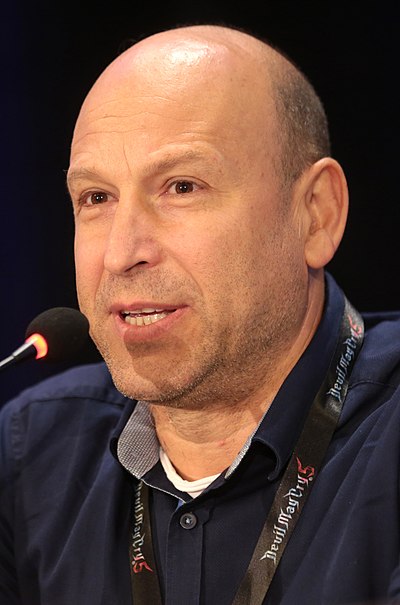
Search
Inon Zur

Inon Zur (Hebrew: ינון צור, [jiˈnon ˈt͡sur]) is an Israeli-American composer of soundtracks for film, television, and video games. He has composed soundtracks for over 80 video games, which include Dragon Age, EverQuest, Fallout, Prince of Persia, Star Trek, the Syberia series, and Starfield. He has received multiple nominations, including three BAFTAs, and has won several awards, including an Emmy. Various music awards for his soundtracks on Men of Valor (2004), Crysis (2008), Dragon Age: Origins (2009), The Elder Scrolls: Blades (2019), and Starfield (2024).
Early life
Inon Zur was born in Israel. At the age of five, he was trying to compose harmonies with his mother's singing, and became inspired by classical music. He learned to play the French horn as a child, studied piano by the age of eight, and was studying composition by the age of ten. He graduated from the Music Academy of Tel Aviv, and spent four years in the Israeli Army in an elite Armored unit. He emigrated to the United States in 1990 to study at the Dick Grove School of Music for a year, and then under private tutor Jack Smalley, a television music composer, and others for two years at the University of California, Los Angeles.
Career
Zur began his career in 1994 by working on soundtracks for movies, such as Yellow Lotus, featured at the Sundance Film Festival. He signed on to compose for Fox Family for six years, and made soundtracks for various children's television shows produced by Saban Entertainment, including Big Bad Beetleborgs, Digimon and Power Rangers. By 2002, he estimated that he had composed the soundtrack to over 360 Power Rangers episodes. His compositions for these programs were credited to Shuki Levy and Kussa Mahchi (an allias for Haim Saban), with Zur usually only being credited as a music producer. This was allegedly so the duo could collect the music royalties. Zur and all other composers working at this company agreed to give up the rights to their compositions prior to joining. He won his first award during this period in his career, a Telly Award for his work on Power Rangers: Turbo. While he enjoyed the work, he began to want to go work somewhere "more intriguing, more advanced, and basically a place that people really appreciate music more"; his agent overcame his initial reluctance and convinced him to work in the video games industry. His first video game soundtrack was 2000's Star Trek: Klingon Academy, which he started composing for the game in 1997. Zur moved on to prestigious titles, composing for the award-winning and critically acclaimed Baldur's Gate II: Throne of Bhaal in 2001 and Icewind Dale II in 2002, among many others. Icewind Dale II earned him the first of many nominations for video game music awards, that of the Game Audio Network Guild's Music of the Year award. He continued to work on movies and television programs during these years.
Zur has made dozens of cinematic scores for trailers. His last full movie soundtrack to date was that of 2014's Reclaim. He has worked on a few television series since then; his last traditional television soundtrack was for Ghost Whisperer in 2007, though he has composed music for webisode and Animated series since then. He continued to work on numerous video games, including Prince of Persia: The Two Thrones in 2005 and Crysis in 2007. He has garnered several nominations for video game music awards, including his first win, for Men of Valor in the Best Original Instrumental track category of the 2004 Game Audio Network Guild awards.
Zur penned the original musical score for Crysis, Dragon Age, Fallout, Syberia, and Starfield franchises.
The most notable titles Zur has composed for have been Icewind Dale II (2002), EverQuest Online Adventures (2003), Men of Valor (2004), Crysis (2007), Fallout 3 (2008), Prince of Persia (2008), Dragon Age: Origins (2009), Fallout: New Vegas (2010), World of Tanks (2010), Dragon Age II (2011), Fallout 4 (2015), Fallout 76 (2018), The Elder Scrolls: Blades (2019) and, most recently, Starfield (2023).
Performances
Zur's compositions have been played several times in live concerts. The first of these was a concert held in Seoul, South Korea, on May 30, 2006, dedicated to his music for Lineage II: Chronicle V: Oath of Blood. On August 20, 2008, music from his soundtrack to Crysis was played in Leipzig, Germany, at a Video Games Live concert. His music from Dragon Age: Origins and Prince of Persia was performed at the September 26, 2009 "A Night in Fantasia 2009" concert in Sydney, Australia, by the Eminence Symphony Orchestra. Zur was a special guest at the concert.
In an industry first, a dedicated concert of his music from Lord of the Rings: War in the North was performed each evening at the 2011 Electronic Entertainment Expo (E3) in Los Angeles. The one-hour concert series was conducted by Zur and performed by The Hollywood Orchestra and Choir with the participation of The Lyris Quartet and solos from celebrated vocalist Aubrey Ashburn. He originally conducted and recorded the game with the London Philharmonia Orchestra and the Pinewood Singers Choir at the legendary Abbey Road Studios in London.
In 2018, at the London venue the Eventim Apollo, Zur composed his different pieces from the Fallout and The Elder Scrolls series during a live concert that Bethesda Game Studios co-hosted with the War Child (charity). The London Symphony Orchestra performed Zur's Starfield score at Bethesda's 10th Anniversary The Elder Scrolls V: Skyrim concert in 2021. The Hollywood Bowl Orchestra gave a 10-year concert on June 25, 2023, at The Game Awards, which featured well-known video game soundtracks. The concert included a rendition of Zur's Starfield theme.
Legacy
Zur's music has been featured in numerous top-selling game franchises. He has been described as being "internationally recognized as one of the A-list orchestral composers in the video games industry". Variety named him on a short list of top video game composers.
In the film industry Zur specializes on cinematic scoring for film trailers. He's worked with the likes of BMG Production Music on films such as the Harry Potter and the Order of the Phoenix, X-Men Origins: Wolverine, The Hobbit, and Avengers: Age of Ultron. Including dozens of other film trailer music.
His songs have often been covered by numerous artists. Raney Shockne and Elizaveta did a cover of Zur's Dragon Age: Origins "I am the One" song for Dragon Age: Inquisitions. Zur was inducted into The Recording Academy as a new member in 2023.
Musical style and influences
Zur's compositions frequently are focused on full orchestras, choir and, in some games like Prince of Persia, ethnic instruments like Arabic flutes and the woodwind duduk. He has often collaborated with the Northwest Sinfonia orchestra from Seattle, though he has on occasion used other orchestras. Whenever Zur works with a real orchestra, he always conducts it himself. He has named some of his musical influences as classical artists such as Sergey Prokofiev, Igor Stravinsky, and Beethoven, movie composers like John Williams and Jerry Goldsmith, and jazz artists like George Gershwin and Henry McFeeny. While he would one day like to compose music not intended to be part of a larger piece of media, he finds that the pressure of a deadline and the feedback from the developers are crucial in his development process. He feels that his music sounds best when it is in the context given by the media it was made for, though he feels that performances of the music by itself transforms it "from just a soundtrack to an art form on its own". Zur sometimes collaborates with other musicians while composing his game soundtracks; for example, he worked with Florence and the Machine to create a unique rendition of "I'm Not Calling You A Liar" for the Dragon Age II soundtrack.
Zur typically is brought in to compose for a game once it is mostly complete, though he notes that that is earlier than for films and television—where nothing changes after he starts besides post-production effects—making video game music composition a more "flexible" process. He finds that it is "crucial" for him to play a game before he can compose music for it, even if it's only a development version. Rather than compose music based around the setting in the game where it will be played, Zur composes music around the emotion that he wants the player to feel at that point in the game. While he feels that music composition technology has come far enough in recent years to no longer be a limiting factor in his music, he does feel that the music budgets for games limit what he can create. Zur feels that he is considered in the industry to be a very fast composer, which he attributes to his tendency to compose music "intuitively", rather than spending a lot of time planning it out. When not composing, Zur likes to play video games, especially those he has composed for, as well as play basketball and spend time with his family. The types of projects that he would like to work on in the future that he has not yet done are children's games and soundtracks incorporating jazz music.
Works
Video games
Films
Television
Awards and nominations
References
External links
- Official website
- Inon Zur at IMDb
Text submitted to CC-BY-SA license. Source: Inon Zur by Wikipedia (Historical)
Articles connexes
- Children of the Sky (song)
- Music of the Fallout series
- Dragon Age: Origins
- Fallout 76
- Fallout 4
- Fallout 3
- Fallout: New Vegas
- Music of Dragon Age: Origins
- Dragon's Dogma
- Prince of Persia: Warrior Within
- Starfield (video game)
- Dragon Age: Inquisition
- Dragon Age II
- Lineage II
- Rise of the Rōnin
- Icewind Dale II
- Tina Guo
- Hans Zimmer discography
- PUBG Mobile
- The Vision of Escaflowne
Owlapps.net - since 2012 - Les chouettes applications du hibou



